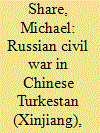| Srl | Item |
| 1 |
ID:
095277


|
|
|
|
|
| Publication |
2010.
|
| Summary/Abstract |
A very important yet little known front in the Russian Civil War existed in neighbouring Xinjiang, a region in China's northwest, that was at that time self-governing. In Xinjiang, Russian White Commanders and their troops gained sanctuary, financial assistance, food and shelter from Chinese provincial leaders, and then used those sanctuaries to launch operations against Soviet forces. However, by 1921, Red Army troops destroyed any remaining organised White forces, which then melted into the Chinese landscape. The ramifications of the Russian Civil War in Xinjiang had important impacts on the people of Xinjiang, and on Russia and China as well.
|
|
|
|
|
|
|
|
|
|
|
|
|
|
|
|
| 2 |
ID:
145212


|
|
|
|
|
| Summary/Abstract |
This article examines how United States officials observed the Slovak Question during the Czechoslovak Republic’s foundation from 1918 to 1921, to determine what the Slovak case exposes about the Wilsonian administration’s view and application of national self-determination after World War I. This article shows how conceptions of modernity were central to Wilsonian national self-determination, as the Wilson administration placed divergent views on the Czechs and Slovaks based on images of civic, economic, and cultural development, despite qualifying the two peoples as a common nationality. In doing so, the Wilson administration prioritized Czech views of a centralized state administered from Prague, over the appeals of many Slovaks who desired domestic autonomy for Slovakia within the state. This Wilsonian prioritization of civic development and modernity over national identity thus abetted a volatile national-political environment in the reorganized East Central Europe by dismissing the views of many national minorities in the region, such as the Slovaks, in their desires for national self-determination.
|
|
|
|
|
|
|
|
|
|
|
|
|
|
|
|